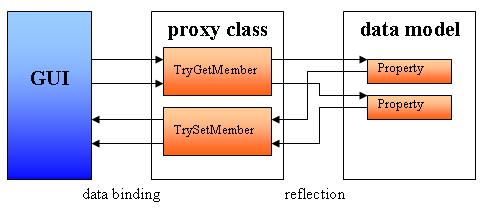Coming from the other side (and if you don't have a fancy Extension) you can "autospecify" changed properties with the extension methods outlined in my answer here:
WCF service proxy not setting "FieldSpecified" property
Specifically, you could use the 'non-reflection method' to configure specific "OnPropertyChanged" handling per class to do other things than just set a specified field.
public static class PropertySpecifiedExtensions2
{
/// <summary>
/// Bind the <see cref="INotifyPropertyChanged.PropertyChanged"/> handler to automatically call each class's <see cref="IAutoNotifyPropertyChanged.Autonotify"/> method on the property name.
/// </summary>
/// <param name="entity">the entity to bind the autospecify event to</param>
public static void Autonotify(this IAutoNotifyPropertyChanged entity)
{
entity.PropertyChanged += (me, e) => ((IAutoNotifyPropertyChanged)me).WhenPropertyChanges(e.PropertyName);
}
/// <summary>
/// Create a new entity and <see cref="Autonotify"/> it's properties when changed
/// </summary>
/// <typeparam name="T"></typeparam>
/// <returns></returns>
public static T Create<T>() where T : IAutoNotifyPropertyChanged, new()
{
var ret = new T();
ret.Autonotify();
return ret;
}
}
/// <summary>
/// Used by <see cref="PropertySpecifiedExtensions.Autonotify"/> to standardize implementation behavior
/// </summary>
public interface IAutoNotifyPropertyChanged : INotifyPropertyChanged
{
void WhenPropertyChanges(string propertyName);
}
And then each class themselves defines the behavior:
public partial class MyRandomClass: IAutoNotifyPropertyChanged
{
/// <summary>
/// Create a new empty instance and <see cref="PropertySpecifiedExtensions.Autospecify"/> its properties when changed
/// </summary>
/// <returns></returns>
public static MyRandomClass Create()
{
return PropertySpecifiedExtensions2.Create<MyRandomClass>();
}
public void WhenPropertyChanges(string propertyName)
{
switch (propertyName)
{
case "field1": this.field1Specified = true; return;
// etc
}
// etc
if(propertyName.StartsWith(...)) { /* do other stuff */ }
}
}
The downside to this is, of course, magic strings for property names making refactoring difficult, which you could get around with Expression parsing?
